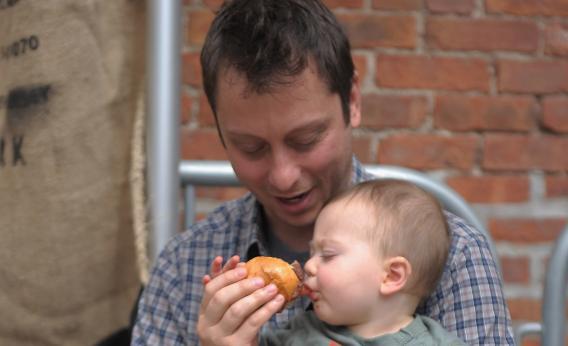After reading Judith Shulevitz fascinating op-ed in the New York Times this week about new research showing how a man’s “lifestyle choices” will affect his future children, I found myself imagining a new section in the next edition of What to Expect When You’re Expecting, a section that will perhaps be called “Best Odds Diet for Dads:” (and I am paraphrasing the mom’s version here):
Future Dads, every bite, sip, inhalation and snort counts. The quality of your sperm is entirely under your control. Before you close your mouth on a forkful of steak, or chomp on that cigar, consider, “Is this the best bite I can give my baby? Will I be responsible for a lifetime of diabetes?” If you think it will benefit your baby, chew away. If it will only appease your appetite or impress your buddies at the post-hockey game bar fest, PUT YOUR FORK DOWN.
Shulevitz explains our growing understanding of “epigenetics,” the idea that genes are turned on or off partly because of the environment and our experiences. For men this means the “toxins they absorb, the traumas they endure, their poverty” – can leave biological traces on children. She describes studies showing that what a boy eats in pre-puberty can permanently reprogram how genes get expressed in his grandchildren. Similarly, Southeast Asian men who chew betel nuts, she writes, “are more likely to have children with weight problem and heart disease.” And children of older men are 2.2 times more likely to have autism as children of 29 year-olds.
There’s no grim revenge here, no perverse joy in knowing that fathers can do great damage to their future children as well. But there’s also no doubt that this new research about the importance of paternal genetic inheritance levels the pregnancy playing field, which until now has involved the judges holding up score cards only for the future mother. Writes Shulevitz: “Think of epigenetics as having ushered in a new age of sexual equality, in which both sexes have to worry about threats to which women once felt uniquely exposed.”
When I read stories about men taking on odious tasks once reserved for women – self care and vanity, for example – I often think it’s a good thing, because – and forgive my corniness here – if we share the burden it becomes less burdensome. When a woman spends countless hours of her life on, say, hair and make-up, probably half of her thinks it’s fun to doll up and the other half thinks it’s annoying and unfair, because her boyfriend or husband gets to splash water on his face and walk out the door. But if men start to primp and groom and eat only yogurt shakes while they’re trying to conceive, then the “unfair” resentful part goes away and creates more space for it to be just fun.
